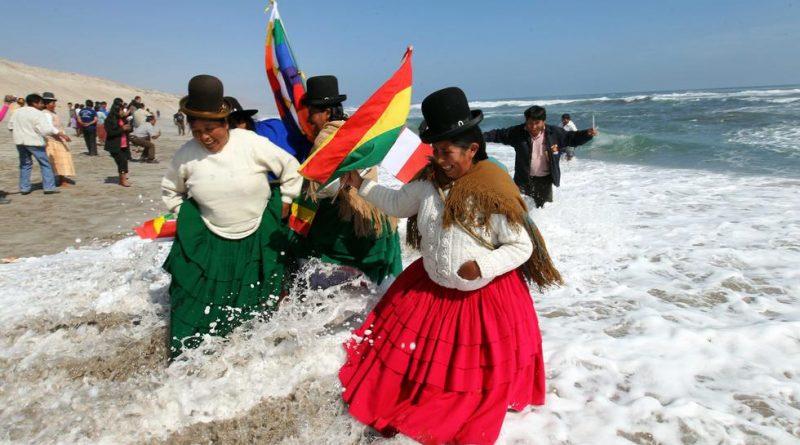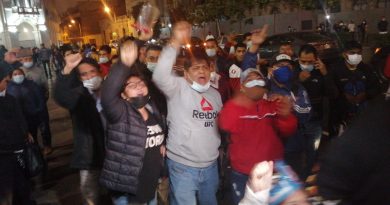How Bolivia Lost its Access to the Sea
Today is Día del Mar (Day of the Sea) in Bolivia. On this day in 1879, the legendary Bolivian general Eduardo Abaroa was killed in the War of the Pacific. In this war, the Chilean army invaded Bolivia’s Litoral department on the pacific coast, thereby leaving Bolivia landlocked. Chile’s invasion was financed by the British Empire because English industrialists had control of the natural resources in the Bolivian coastal region and they refused to pay a new tax imposed by Bolivia. The resources in question included guano, sodium, nitrate, and copper.
Bolivia has not given up its demand to return to the coast. It still maintains a navy in preparation, the only landlocked country in the world to do so. It is more than a territorial dispute: This is a political battle to roll back the hidden legacy of British imperialism in Latin America. The government of Luis Arce hopes to negotiate the issue with Chile’s new President Gabriel Boric.
The war began when the Bolivian government raised taxes on the joint Chilean and British companies operating in Bolivia’s Litoral department. Companies such as the Antofagasta Nitrate & Railway Company (CSFA) refused to pay the new tax, so Bolivia moved to nationalize their mines. In response, Chile unleashed a brutal war that was to last five years, killing 18,000 Bolivians and invading huge parts of Bolivia and even Peru who had sent troops to support Bolivia. The Chilean army reached as far as Lima but later agreed to withdraw and settle for the seizure of Peru’s southern regions such as Arica, as well as Bolivia’s coastal towns like Antofagasta.
Behind this was a vast network of British imperial interests that had built links to sections of the Chilean oligarchy. Ever since the fall of the Spanish Empire in the Americas, Britain was quick off the blocks in establishing informal control of Latin American natural resources. Chile’s leading bank at the time, Banco Edwards, was a subsidiary of the Bank of England, and owned by the same family as Chile’s most prominent newspaper El Mercurio that was key in drumming up popular support for the invasion and framing it as a patriotic war rather than a war for British capitalists.
A British newspaper at the time described Bolivia in the following manner; “It is a semi-barbaric country that does not know civilization. England is not very interested in this nation, but we are interested in the Pacific where there are two countries, Chile and Peru, that are under British influence”.
British economic interests penetrated every port city of the Americas and played off the newly independent republics against each other and encouraged separatism among local elites so as to combat Simon Bolivar’s vision of a united Latin America. Eduardo Galeano described the approach in Open Veins of Latin America saying, “For U.S. imperialism to rule Latin America today, it was necessary for the British Empire to help divide and rule us yesterday. An archipelago of disconnected countries came into being as a result of the frustration of our national unity.”
Britain proceeded to play a vital role in funding Chile’s invasion, providing it with huge supplies of arms and logistical support. The meager forces of Bolivia and Peru never stood a chance.
Today, it is estimated that lack of access to the sea deprives Bolivia of 1.5% in annual economic growth. For British imperial interests, the outcome was everything they hoped for. Yorkshire industrialist John Thomas North established a monopoly over the vast nitrate fields in Litoral and the British-linked Edwards family reaped huge rewards from the captured natural resources. These oligarchs formed a caste that wielded huge political power and plunged Chile into civil war in 1891 when the progressive president Balmaceda tried to introduce competition laws to break up their monopolies. The civil war ended in victory for the oligarchy.
Chileans did not benefit from the War of the Pacific, they were left indebted to Britain to the tune of millions for the support they received. The natural resources in Litoral fell into the hands of a tiny number of families who exported these primary materials on the cheap to the global north. Peruvian historian Enrique Amayo perhaps summed it up best when he said “Imperialist Great Britain helped Chile, but in the end, Chile too became the loser”. This war was more than 140 years ago, but for Bolivians it remains an open wound.
For more news and analysis, check out our podcast Latin America Review: https://linktr.ee/latinamericareview
By Kawsachun News



